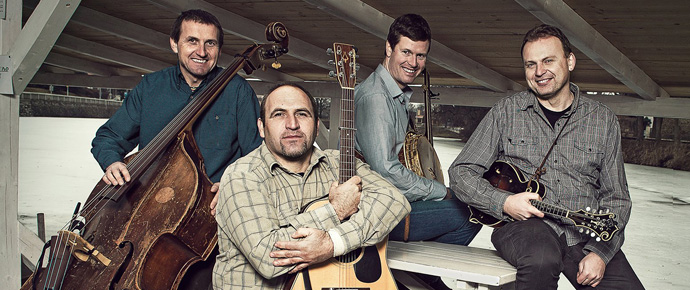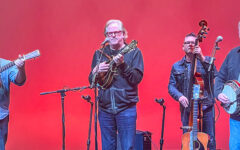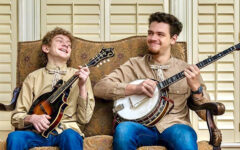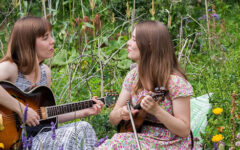
For those that follow the international growth of bluegrass to realms well beyond America’s borders, any discovery that finds the music played in otherwise unheard of realms confirms the fact the music does indeed have a very wide reach.
That’s exemplified by the efforts of a band called Blueland, a four-piece bluegrass outfit that hails from Slovakia. Currently consisting of Miloš Tomka on guitar and vocals, Stanislav Tomka on acoustic bass, Pavol Daňo on mandolin and vocals, and Ralph Schut on banjo and vocals, the group was originally formed in 1995 by the Tomka brothers and two of their colleagues, and has maintained its current incarnation since 2002.
“The Tomka Brothers both live in Koplotovce near Trnava, credited as being the the home of the Dobro, and our mandolin player lives in a town called Dubnica nad Váhom,” Schut explains. “I come from The Netherlands, but now lives in the Czech Republic, about a three hour drive from Koplotovce. Rehearsals are usually in Slovakia, but the band usually has more gigs in the Czech Republic.”
On their website, the group calls their music a combination of “Solid rhythm, fancy picking, soulful singing and tight harmony vocals and — most of all — a great love for bluegrass music and good people!”
“As long as we feel we can live up to it, we will describe as our sound as ‘energetic’ or ‘high-voltage’,” Schut continues. “We focus on sharing our excitement with audiences through a varied mix of songs with different moods – romantic, bluesy, fast ones, Gospel songs with three- and four-part harmonies, including a-cappella. Also, we sing part of our repertoire in Slovak so that the local audiences can connect with us better.”
Happily, their efforts appear to have paid off, not only at home, but also in other realms as well. Prior to the pandemic, the group played festivals throughout Europe, including those in Sweden, Norway, The Netherlands, France, Germany, Switzerland, and, of course, the Czech and Slovak Republics. The more notable gatherings where they’ve performed include La Roche Bluegrass Festival in France, the Bluegrass Family Festival and the Sunny Mountain Grass Festival in Switzerland, the European Bluegrass Festival in Voorthuizen, The Netherlands, Sweden’s Torsby Country Festival, and the Risor Bluegrass Festival in Norway.
In addition, Blueland had the high honor of accompanying reso-guitar player LeRoy McNees, once a featured musician on the old Andy Griffith Show, during his appearance at the legendary Dobrofest in Trnava, Slovakia in 1998. “Many of the premier Dobro players performed at this festival and Blueland was usually there to admire them and sometimes even to jam with them,” Schut recalls.
Not surprisingly then, the members’ influences span a wide array of venerable bluegrass bands of a varied vintage. They include Doyle Lawson & Quicksilver, The New Grass Revival, The Lonesome River Band, Blue Highway, Loose Ties, The New Tradition, Special Delivery, Northern Lights, Livewire, and Wildfire.
“We love everything Robert Hale has recorded,” Schut says, citing their affection for the work of Wildfire in particular.
Blueland has recorded five albums to date — Bluegrass Celebration (1996), Prvý Krát (or First Time) (1999), Fire (2001), All My Life (2005) and their most recent, More Than Enough (2018).
“We play more covers, simply because we don’t write enough,” Schut allows. “Sometimes we also add Slovak lyrics to American originals.”
That may be one reason why the band’s music has been so well received at home. Schut describes the band’s following as a small but steady and faithful fanbase in Slovakia, adding, “Our music is usually very well received in the Czech and Slovak Republics, as the audiences understand our Slovak lyrics. Most people speak little or no English. That’s is a big plus when performing in our home countries. The Czechs also appreciate this as the languages are similar and previously, we were one country.”
Schut goes on to explain how the music took hold in his country. “In the Czech and Slovak Republics, the story is more complicated,” he relates. “For example, during the communist period, only a few people had access to American records. However, bands like the Greenhorns and The Rangers did, and they added their own, often very good Czech lyrics to American country hits. They then had their own hit songs as a result. They’re considered the first generation of Czech country musicians.”
That said, he also has his own practical theory as to why bluegrass has become engrained in so many nations the world over.
“Maybe it’s because us musicians are fun people to be around with,” he says with a smile. “In many countries, local acoustic folk music is quite similar in structure. Many folk musicians love bluegrass when they first hear it. Then they try to learn to play a few songs and eventually become involved in the small but friendly local bluegrass communities.”
Schut caps those comments with an invitation of his own:
“Of course, the best thing would be to come over here for a holiday, visit a few festivals and jam sessions and experience it first-hand – y’all are very welcome!”







